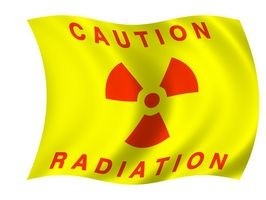Radiation Safety Officer Responsibilities

In industries and facilities that use radioactive materials, the safety and health of employees is a major concern. Radiation safety officers are responsible for ensuring that radiation processes and radioactive materials are used safely and that all regulatory measures are followed. They may be employed at bio-tech and pharmaceutical companies, hospitals, government agencies and power plants. Most radiation safety officers have at least a bachelor's degree, which is usually earned in a science-related field. Radiation safety officers are often under a great deal of stress because the position carries many responsibilities, all of which play an integral role in keeping workers safe and healthy.
Licensing and Records
Radiation safety officers are responsible for ensuring that their organization has proper licensing for the radioactive materials that are utilized. They also make sure that only staff members authorized under the terms of the license handle the materials. Radiation safety officers also conduct periodic tests to ensure that the terms and conditions of the license are met, and enforce all federal, state and local regulations regarding radioactive materials within the facility. In many cases, radiation safety officers represent their organization in dealings with regulatory agencies. They must also keep careful records of all transactions regarding radioactive materials, such as receipts, transfers and disposals.
Policy and Procedures
Radiation safety officers play a role in establishing organizational safety policy and procedures. This typically includes developing operating and emergency procedures and acting as a consultant to management when it comes to instituting new safety policies. Radiation safety officers may also interview staff members who handle radioactive materials to see what policies or procedures they believe should be enacted.
Materials
Radiation safety officers order radioactive materials and keep a careful inventory of all items. They must also test radioactive materials for leaks on a regular basis. Radiation safety managers also advise staff members on the proper use and storage of materials. They ensure that radioactive materials are secured at all times as well, and maintain safety supplies such as protective clothing and shields, labels and radiation signs. Radiation safety officers must also supervise the safe disposal of radioactive waste.
Personnel Monitoring
Radiation safety officers must examine all personnel monitoring reports and make staff members aware of high or excessive radiation exposure. They are also responsible for notifying the proper regulatory agency if workers are exposed to high levels of radiation and must lead an investigation into any unusual exposure cases. Radiation safety officers must take measures to control and avoid high levels of exposure in an effort to safeguard employees’ health. They also must investigate any accidents or spills that involve radioactive materials.
Training
Radiation safety officers must ensure that all staff members receive proper training to handle radioactive materials. They must instruct employees in how to protect themselves from radiation exposure, as well as how to use radioactive materials and equipment safely.
Management Liason
Radiation safety officers serve as a liaison between the organization’s management and radiation employees. They must inform management of any emergencies or accidents that endanger employees, and make them aware of any concerns that employees may have about their safety.
Licensing and Records
Radiation safety officers are responsible for ensuring that their organization has proper licensing for the radioactive materials that are utilized. They also make sure that only staff members authorized under the terms of the license handle the materials. Radiation safety officers also conduct periodic tests to ensure that the terms and conditions of the license are met, and enforce all federal, state and local regulations regarding radioactive materials within the facility. In many cases, radiation safety officers represent their organization in dealings with regulatory agencies. They must also keep careful records of all transactions regarding radioactive materials, such as receipts, transfers and disposals.
Policy and Procedures
Radiation safety officers play a role in establishing organizational safety policy and procedures. This typically includes developing operating and emergency procedures and acting as a consultant to management when it comes to instituting new safety policies. Radiation safety officers may also interview staff members who handle radioactive materials to see what policies or procedures they believe should be enacted.
Materials
Radiation safety officers order radioactive materials and keep a careful inventory of all items. They must also test radioactive materials for leaks on a regular basis. Radiation safety managers also advise staff members on the proper use and storage of materials. They ensure that radioactive materials are secured at all times as well, and maintain safety supplies such as protective clothing and shields, labels and radiation signs. Radiation safety officers must also supervise the safe disposal of radioactive waste.
Personnel Monitoring
Radiation safety officers must examine all personnel monitoring reports and make staff members aware of high or excessive radiation exposure. They are also responsible for notifying the proper regulatory agency if workers are exposed to high levels of radiation and must lead an investigation into any unusual exposure cases. Radiation safety officers must take measures to control and avoid high levels of exposure in an effort to safeguard employees’ health. They also must investigate any accidents or spills that involve radioactive materials.
Training
Radiation safety officers must ensure that all staff members receive proper training to handle radioactive materials. They must instruct employees in how to protect themselves from radiation exposure, as well as how to use radioactive materials and equipment safely.
Management Liason
Radiation safety officers serve as a liaison between the organization’s management and radiation employees. They must inform management of any emergencies or accidents that endanger employees, and make them aware of any concerns that employees may have about their safety.
- fy23c99ff41adc7539afc41936d5607f52.jpg
References
http://www.ehow.com/list_7221190_radiation-safety-officer-responsibilities.html
http://img.ehowcdn.com/615x200/ds-photo/60/210/fotolia_3929119_XS.jpg